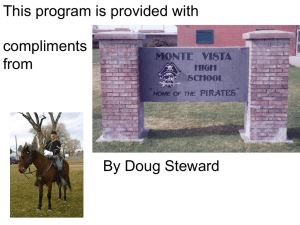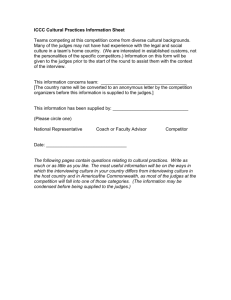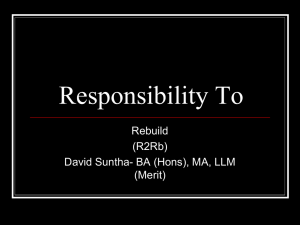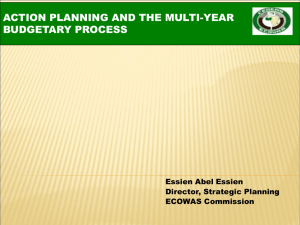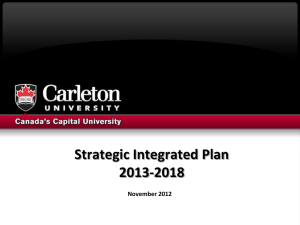Ms. Laurina KOSTER
advertisement
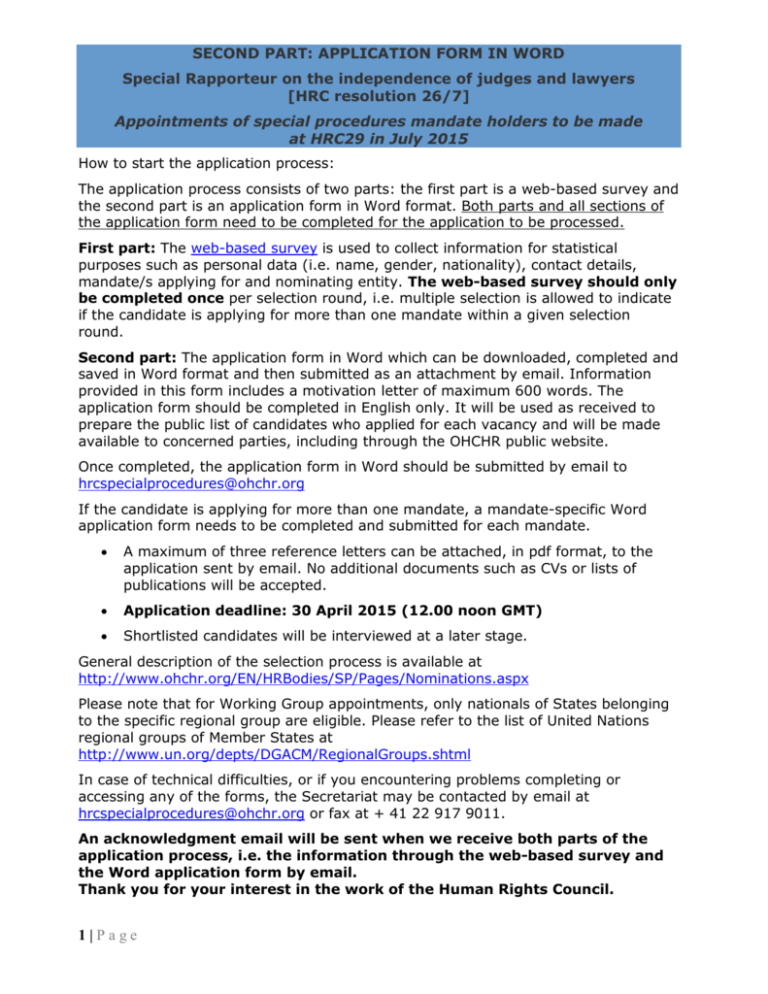
SECOND PART: APPLICATION FORM IN WORD Special Rapporteur on the independence of judges and lawyers [HRC resolution 26/7] Appointments of special procedures mandate holders to be made at HRC29 in July 2015 How to start the application process: The application process consists of two parts: the first part is a web-based survey and the second part is an application form in Word format. Both parts and all sections of the application form need to be completed for the application to be processed. First part: The web-based survey is used to collect information for statistical purposes such as personal data (i.e. name, gender, nationality), contact details, mandate/s applying for and nominating entity. The web-based survey should only be completed once per selection round, i.e. multiple selection is allowed to indicate if the candidate is applying for more than one mandate within a given selection round. Second part: The application form in Word which can be downloaded, completed and saved in Word format and then submitted as an attachment by email. Information provided in this form includes a motivation letter of maximum 600 words. The application form should be completed in English only. It will be used as received to prepare the public list of candidates who applied for each vacancy and will be made available to concerned parties, including through the OHCHR public website. Once completed, the application form in Word should be submitted by email to hrcspecialprocedures@ohchr.org If the candidate is applying for more than one mandate, a mandate-specific Word application form needs to be completed and submitted for each mandate. A maximum of three reference letters can be attached, in pdf format, to the application sent by email. No additional documents such as CVs or lists of publications will be accepted. Application deadline: 30 April 2015 (12.00 noon GMT) Shortlisted candidates will be interviewed at a later stage. General description of the selection process is available at http://www.ohchr.org/EN/HRBodies/SP/Pages/Nominations.aspx Please note that for Working Group appointments, only nationals of States belonging to the specific regional group are eligible. Please refer to the list of United Nations regional groups of Member States at http://www.un.org/depts/DGACM/RegionalGroups.shtml In case of technical difficulties, or if you encountering problems completing or accessing any of the forms, the Secretariat may be contacted by email at hrcspecialprocedures@ohchr.org or fax at + 41 22 917 9011. An acknowledgment email will be sent when we receive both parts of the application process, i.e. the information through the web-based survey and the Word application form by email. Thank you for your interest in the work of the Human Rights Council. 1|Page SECOND PART: APPLICATION FORM IN WORD Special Rapporteur on the independence of judges and lawyers [HRC resolution 26/7] Appointments of special procedures mandate holders to be made at HRC29 in July 2015 I. PERSONAL DATA 1. Family name: Koster 5. Sex: 2. First name: Laurina 6. Date of birth (dd-mm-yy): 6-sep50 7. Place of birth: Amsterdam 3. Maiden name (if any): 4. Middle name: Jacoba Louise Male Female 8. Nationality (please indicate the nationality that will appear on the public list of candidates): Dutch 9. Any other nationality: - II. MANDATE - SPECIFIC COMPETENCE / QUALIFICATIONS / KNOWLEDGE NOTE: Please describe why the candidate’s competence / qualifications / knowledge is relevant in relation to the specific mandate: 1. QUALIFICATIONS (200 words) Relevant educational qualifications or equivalent professional experience in the field of human rights; good communication skills (i.e. orally and in writing) in one of the six official languages of the United Nations (i.e. Arabic, Chinese, English, French, Russian, Spanish.) With a law degree and a postgraduate program as a point of departure I have gained a multidisciplinary approach to all my work both by multifaceted permanent education and leadership training and positions. • Master in Law, University of Utrecht (1974) • European Law, Centre Européen Universitaire of Nancy,France (1975) • Strategy and Leadership in the public sector (post graduate, Groningen University, (2002/2003) • Leadership Course in the Gambia, Africa (2006) • Permanent legal and non-legal education, like communication & media, behaviour based interviewing, mediation, social and cultural relationships (1976-2015) Skills (1)Investigation and fact finding,(2) diplomacy and advocacy skills, (3) reporting/communication of observations, opinions and judgements (also to the public) (4) strategic networking at policy and political level, successively acquired in my different assignments as the chair of the Dutch Equal Treatment Commission and the Netherlands Institute for Human Rights (2008-june 2015); Court president/ 2|Page SECOND PART: APPLICATION FORM IN WORD Special Rapporteur on the independence of judges and lawyers [HRC resolution 26/7] Appointments of special procedures mandate holders to be made at HRC29 in July 2015 member of national assembly of presidents (2003-2008); Judge (1986-2008); Attorney(1976-1986); Language skills English: easily (read,written and spoken) French: easily (read,written and spoken} Dutch: mother tongue German and Italian: basic knowledge 2. RELEVANT EXPERTISE (200 words) Knowledge of international human rights instruments, norms and principles. (Please state how this was acquired.) Knowledge of institutional mandates related to the United Nations or other international or regional organizations’ work in the area of human rights. (Please state how this was acquired.) Proven work experience in the field of human rights. (Please state years of experience.) I have brought the national equality body to an A-accredited NHRI.I lead the national monitoring of HR and equal treatment, and the interaction with the UN-Treaty body and UPR system, OHCHR, special mandate holders and the HR-institutions of the Council of Europe (investigating,reporting and organizing (inter)national support for recommendations; monitoring follow-up of concluding observations,2008-2015) HR-norms were inherent to my judicial work (including supervision of notaries) (2003-2008)and member of the supervisory committee of juvenile prisons (20062009). My experience with the standards of integrity and independence and the transparency, impartiality and accountability standards for the judiciary was acquired on practical, policy and institutional levels, by contributing to: *Steeringgroups in the judiciary (Information of the public, Transparency, Improvement of the performance of the judiciary (2003-2008), Court annexed mediation(2002), Effective access to justice (2006-2008). *Local training in Integrity dilemmas for judges and staff, Professional attitude and dilemmas for Rwandese and Dutch judges ( Rwanda 2008), international seminar “Societal developments and your judgment” (2004). *Lecturing on quality tools (i.a. the French National School for the Judiciary(20052008). *Selection-committee for the judiciary (1997-2006). *Training lawyers(1979-1980 3. ESTABLISHED COMPETENCE (200 words) Nationally, regionally or internationally recognized competence related to human rights. (Please explain how such competence was acquired.) My professional and institutional judicial competences were nationally acknowledged by my appointment as (only the third female) president of a court; competences 3|Page SECOND PART: APPLICATION FORM IN WORD Special Rapporteur on the independence of judges and lawyers [HRC resolution 26/7] Appointments of special procedures mandate holders to be made at HRC29 in July 2015 related to HR by the successive appointments as chair of the equality body and the NHRI.And also by requests of other NHRI’s to share my experience numerous keynote presentations, guest lectures on human rights at most universities in the Netherlands, Gent (Belgium), Monash University Australia), for businesses, societies, NGOs, expert organizations and the training of judges. presentations to many foreign delegations in the framework of Dutch HRprograms appointments as a member of: the advisory board of the Leiden University Advanced Master for HR and the supervisory board of the Dutch section of Oxfam (development organisation with a rights based approach) a share in the international performance of the equality network Equinet and the European NHRI network ENNHRI At the regional and international level I have participated upon invitation in capacity building in the field of human rights in Turkey (2011 and 2014), Tunisia (2013), Morocco (2012/2013 and upcoming 2015/2016), partly in cooperation with UNDP and UN-Women. These contacts also gave rise to contacts with the international NGOs Lawyers for lawyers and Judges for Judges. 4. FLEXIBILITY/READINESS AND AVAILABILITY OF TIME (200 words) to perform effectively the functions of the mandate and to respond to its requirements, including participating in Human Rights Council sessions in Geneva and General Assembly sessions in New York, travelling on special procedures visits, drafting reports and engaging with a variety of stakeholders. (Indicate whether candidate can dedicate an estimated total of approx. three months per year to the work of a mandate.) My second formal term as chair of the Netherlands Institute for Human Rights expires on the 15th of June 2015. I will continue to give some lectures or masterclasses at universities and do capacity projects for human rights institutions. This is all well planned and generally takes a few days per project. I do not aspire anymore to a full time job. My position in the supervisory board of organization(s) linked to human rights will take limited time What will facilitate the work as special rapporteur is the support of a small team of advanced master students who will assist me in the preparation of visits and reports. Therefor I can dedicate 3-4 months per year to the work of the mandate. There is no impediment to my undertaking the necessary travel and participation in meetings, events and conferences in Geneva and elsewhere. 4|Page SECOND PART: APPLICATION FORM IN WORD Special Rapporteur on the independence of judges and lawyers [HRC resolution 26/7] Appointments of special procedures mandate holders to be made at HRC29 in July 2015 III. MOTIVATION LETTER (600 word limit) I will be certainly honoured to be selected for the duty to assess the situation of judges and lawyers worldwide, with respect to their own human rights and the systemic safeguards for their proper functioning in terms of independence, impartiality, integrity and expertise. This assignment is appealing to me as it requires a combination of all my working experience, as it asks for a good knowledge of HR norms and experience with their implementation mechanisms credibility in the respective professional groups through experience in the field at a professional and an institutional level, a natural and careful approach to and involvement of the range of relevant stakeholders, awareness of the need of a prudent and diplomatic dialogue with high ranking institutional and political officials with attention to their interests and values without compromising human rights norms, in order to achieve the necessary effect, a cautious but effective dealing with the media. But far more important to me is the opportunity to serve my true ambition to realise effective access to human rights for every human being without discrimination one st. Judges and lawyers should be the first line of defence when access to rights is denied or simply not realised. This makes them both particularly important and vulnerable in the execution of their duties. Therefor it would be most rewarding to me to take an active role in the response on violations of their human and professional rights and in watching the safeguards, which constitutions and national policies should offer them. The same goes for the possibility to contribute to the awareness of the professionals themselves -but also of all other parties - that (trained) skills, integrity, responsibility and accountability are as important safeguards for the functioning of the judicial system as the institutional ones. The personal functioning of judges and lawyers and their awareness of the context and the effects of their performance are basic elements for trust in the judicial system. Being the latter in itself a precondition for welfare and development. A challenging aspect for me would be that the special rapporteur is in a position not only to report but also to raise awareness with respect to the impact, which decisions in individual cases could and should have on the progressive realization of human rights; also for woman and vulnerable groups. By giving the observations of a concerned outsider, who is also informed by important stakeholders like NGOs ( which judges or lawyers may never meet themselves), it will be possible to inspire to changes of systems and habits. As I am aware that real changes generally take time and only happen when people are willing to leave their comfort zone, it seems a good path to try to harvest on the work of previous rapporteurs but also to explore new directions. One of these could be closer contacts between lawyers and judges and the national human rights institution of their country, because NHRI’s are so very well positioned within the the 5|Page SECOND PART: APPLICATION FORM IN WORD Special Rapporteur on the independence of judges and lawyers [HRC resolution 26/7] Appointments of special procedures mandate holders to be made at HRC29 in July 2015 national structure and embedded in the UN-system at the same time. It may be fruitful to do research into best practices for this sort of interaction. I also would like to take a closer look into the situation of lawyers whose position lately has not been that visible at the UN-level. Where needed this should be done in consultation with the present SR on human rights defenders,Michel Forst, who is supporting my candidature for this mandate. Attachments: Letter of reference of Prof. Cees Flinterman Letter of reference of Prof Alan Miller, Chair of ENNHRI, the European Network of national Human Rights Institutions and Chair of the Scottish Human Rights Institution 6|Page SECOND PART: APPLICATION FORM IN WORD Special Rapporteur on the independence of judges and lawyers [HRC resolution 26/7] Appointments of special procedures mandate holders to be made at HRC29 in July 2015 IV. LANGUAGES (READ / WRITTEN / SPOKEN) Please indicate all language skills: Mother tongue: Dutch Arabic: Yes or no: no If yes, Read: Easily or Not easily: Write: Easily or Not easily: Speak: Easily or Not easily: Chinese: Yes or no: no If yes, Read: Easily or not easily: Write: Easily or not easily: Speak: Easily or not easily: English: Yes or no: yes If yes, Read: Easily or not easily: easily Write: Easily or not easily: easily Speak: Easily or not easily: easily French: Yes or no: yes If yes, Read: Easily or not easily: easily Write: Easily or not easily: easily Speak: Easily or not easily: easily Russian: Yes or no: no If yes, Read: Easily or not easily: Write: Easily or not easily: Speak: Easily or not easily: Spanish: Yes or no: no If yes, Read: Easily or not easily: Write: Easily or not easily: Speak: Easily or not easily: 7|Page SECOND PART: APPLICATION FORM IN WORD Special Rapporteur on the independence of judges and lawyers [HRC resolution 26/7] Appointments of special procedures mandate holders to be made at HRC29 in July 2015 V. EDUCATIONAL RECORD NOTE: Please list the candidate’s academic qualifications (university level and higher). Name of degree and name of academic institution: Years of attendance (from-to): Place and country: Master in Law, University of Utrecht 1969-1974 Utrecht, The Netherlands Postgradute European Law, C.E.Universitaire de Nancy 1974-1975 Nancy,France Postgraduate Course Strategy and Leadership in the Public Sector, Groningen University 2002-2003 Groningen,The Netherlands 8|Page SECOND PART: APPLICATION FORM IN WORD Special Rapporteur on the independence of judges and lawyers [HRC resolution 26/7] Appointments of special procedures mandate holders to be made at HRC29 in July 2015 VI. EMPLOYMENT RECORD NOTE: Please briefly list ALL RELEVANT professional positions held, beginning with the most recent one. Name of employer, functional title, main functions of position: Kingdom of the Netherlands, succeeding positions as chair of the Equal Treatment Commission and the Netherlands Institute for Human Rights Kingdom of the Netherlands positions as courtpresident and chair of the Board of Supervision on the notaries public Years of work (from-to): 2008-2015 2003-2008 Place and country: Utrecht, The Netherlands Alkmaar, the Netherlands Kingdom of the Netherlands, position as member of the Commission of Oversight of 2 juvenile prisins Kingdom of the Netherlands, positions as judge and vice-president of the Court of haarlem 1986-2003 Haarlem, the Netherlands Schut & Grosheide Lawfirm, lawyer at the Amsterdam Bar 1976-1986 Amsterdam & Alkmaar, the Netherlands Schenkeveld & Sluis Lawfirm, lawyer at the Alkmaar Bar 9|Page SECOND PART: APPLICATION FORM IN WORD Special Rapporteur on the independence of judges and lawyers [HRC resolution 26/7] Appointments of special procedures mandate holders to be made at HRC29 in July 2015 VII. COMPLIANCE WITH ETHICS AND INTEGRITY PROVISIONS (of Human Rights Council resolution 5/1) 1. To your knowledge, does the candidate have any official, professional, personal, or financial relationships that might cause him/her to limit the extent of their inquiries, to limit disclosure, or to weaken or slant findings in any way? If yes, please explain. o 2. Are there any factors that could either directly or indirectly influence, pressure, threaten, or otherwise affect the candidate’s ability to act independently in discharging his/her mandate? If yes, please explain: no 3. Is there any reason, currently or in that past, that could call into question the candidate’s moral authority and credibility or does the candidate hold any views or opinions that could prejudice the manner in which she/he discharges his mandate? If yes, please explain: no 4. Does the candidate comply with the provisions in paragraph 44 and 46 of the annex to Human Rights Council resolution 5/1? Para. 44: The principle of non-accumulation of human rights functions at a time shall be respected. Para. 46: Individuals holding decision-making positions in Government or in any other organization or entity which may give rise to a conflict of interest with the responsibilities inherent to the mandate shall be excluded. Mandate holders will act in their personal capacity. yes 5. Should the candidate be appointed as a mandate holder, he/she will have to take measures to comply with paragraphs 44 and 46 of the annex to Council resolution 5/1. In the event that the current occupation or activity, even if unpaid, of the candidate may give rise to a conflict of interest (e.g. if a candidate holds a decision-making position in Government) and/or there is an accumulation of human rights functions (e.g. as a member of another human rights mechanism at the international, regional or national level), necessary measures could include relinquishing positions, occupations or activities. If applicable, please indicate the measures the candidate will take. Formally I have the function of deputy judge, since 2008 appointed for life. I have not taken the oath, so functioning as a judge is not possible. There is no remuneration. If necessary I will resign as a deputy judge. 10 | P a g e SECOND PART: APPLICATION FORM IN WORD Special Rapporteur on the independence of judges and lawyers [HRC resolution 26/7] Appointments of special procedures mandate holders to be made at HRC29 in July 2015 **** 11 | P a g e
![SECOND PART: APPLICATION FORM IN WORD [HRC resolution 26/7]](http://s2.studylib.net/store/data/017689050_1-dd2876a87e3d53857e3ffb4df344835d-300x300.png)
![SECOND PART: APPLICATION FORM IN WORD [HRC resolution 26/7]](http://s2.studylib.net/store/data/017688995_1-081e73b174f2e7974caf0b8bc719e685-300x300.png)
![SECOND PART: APPLICATION FORM IN WORD [HRC resolution 26/7]](http://s2.studylib.net/store/data/017689055_1-f9619efe56c1bcbc4602383a1ad09fff-300x300.png)
